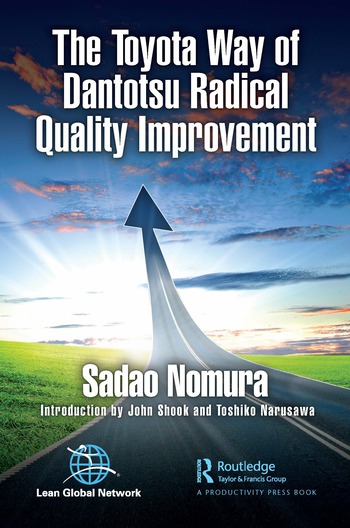Dear Gemba Coach,
Why do you keep using confusing Japanese terms such as “monozukuri” or “hitozukuri” rather than plain English? Isn’t that what professionals do when they want to obfuscate and befuddle clients?
Obfuscate and befuddle – I like it! This is a fair point, and my answer will probably not please you, but I don’t write to try to convince people to adopt lean – many other excellent writers do this better than I ever can. I write for those who have already adopted lean and seek to get it right. And the difficulty there is understanding what Toyota has done, did, is doing different, and not what we think we already know about “lean.”
Let’s have this conversation on the gemba. You and I are visiting the sales showroom of a company that sells farming equipment. The company’s lean officers show us a good looking obeya they’ve set up for the sales team. It has all the elements of performance management:
- Clear daily targets
- Problem/action boards
- Indicators to reflect past performance
- Tracking of paperwork issues.
In this obeya, the sales team runs daily a five-minute meeting to prep the day and sell: chase leads, take care of customers, and so on. A large part of the “and so on,” of course, is the muda – sorry, waste – of phoning up customers to tell them the equipment they ordered is not ready as planned or having to deal with incomplete paperwork that has not been validated by the central office, you name it.
Lean, right?
Then you ask to see the kaizen.
Awkward silence.
Or you ask what is the difference between a good sale and a bad sale.
Puzzled silence – a sale is a sale, surely?
2 Huge Mistakes by the Lean Guys
Actually, as the CEO there explained, there are good sales and bad sales. A good sale is one where the customer feels he or she made a good deal and is happy after the sale, and will recommend the company. A bad sale is one where the customer feels they’ve been had after the sale and becomes a detractor (this company follows closely its Net Promoter Score).
Which makes perfect sense – the CEO needs to take care of the business today, which means reaching sales targets of this month, but also of the business tomorrow which means making sure that sales today lead to sales tomorrow.
From the lean point of view, it turned out that may of the problems being addressed on the board in the obeya were about better following internal procedures and filling in internal paperwork – which does make sense because poorly filled in paperwork will block or slow a sale – but is still about improving something that is essentially muda (sorry again, waste).
Because of their lack of understanding monozukuri and hitozukuri (and no blame on them; they were never told), the lean officers, who did an excellent job of getting the sales team to create an obeya and work with it, are making two huge mistakes.
- Monozukuri: At Toyota, monozukuri means something like “conscientious manufacturing for making better cars.” I tend to interpret this loosely as the passion for making things. If you’re a car sales company, monozukuri would mean the “passion for making better sales” (as in good sales, not just more), or “the conscientious making of a sale.” Basically, it’s about looking at the sale itself, how it is produced and being passionate about improving the sales-production process and the sale itself. By focusing on internal processes away from the sale itself, the lean officers are orienting the sales team away from their passion and mission: sales.
- Hitozukuri: Hitozukuri means developing people, in the sense of teaching them to gain autonomy on specific problems and develop better judgment. This is not about getting people to apply processes more rigidly, but, on the contrary giving them reference points and space to think on the job so that they reflect on their own practices and learn to do things better by themselves – with the support we can give them. By insisting on following bureaucratic processes, the lean officers are trying to “fix” the sales people through more control, rather than develop their inner abilities and talents to produce sales.
As a result of their misunderstanding of the spirit behind the tools (another interesting perspective on monozukuri and hitozukuri can be found here), the lean officers are reinforcing bureaucratic control and wasteful efforts, rather than fight with the sales team to remove corporate-imposed waste from their own processes. Because they’re good at their job, they will probably convince the sales team to better adhere to the process – at least for a while – but they are in no way helping them to develop the flexibility needed for better sales.
Words with the Lean Spirit
Because while they’re fighting to improve compliance, the discussion that is not happening is that some salespeople are far more productive than the norm: they make faster, easier sales, with more content customers. Making faster sales also allows them to make more sales in the same time, and so contribute more to the growth of the company.
What is it these star salespeople do better? It’s hard to know. They’re visibly not the more “salesy” members of the team. They’re often the more experienced – they just seem to have a knack to get customers through the sales process more elegantly, more leanly – than others. Yet, when asked, they can’t say for sure what they do differently.
Which is precisely why we need kaizen – the challenge for the company is huge, and improving even marginally its salespeople’s productivity (in good sales) will increase massively its profitability, overall sales, and image if they truly are good sales from the point of view of the customer (which is critical to future growth).
The stakes are high for the company, and hinge on the lean officers putting their energies on the right topics, to work with sales managers to focus their teams on kaizen to observe and discuss with their salespeople how to produce more, easier good sales; monozkuri from hitozukuri.
Sure, we could say this in English: to make products conscientiously first you have to develop people, but the word sound so bland they would not attract attention, and are quite vague. Using the Japanese terms creates cognitive markers so that people look up – and yes, some other people shut their minds off. Think about it: we’re looking to support learning and energy for kaizen, what can we do with people who turn off just because the word sounds unfamiliar?
Yes, jargon is annoying and frustrating. Yes, every additional jargony word has a cost in any profession. But we can still allow ourselves a budget of 10 to 20 specific words that carry the spirit of what matters in the field. I’m not arguing for stupid acronyms or over-esoteric terms, but for making certain that the unique spirit and meaning of lean is understood by people practicing lean. This is, I believe, a necessary kaizen for all of us lean authors – at the risk of obfuscating and befuddling at a much deeper level.






